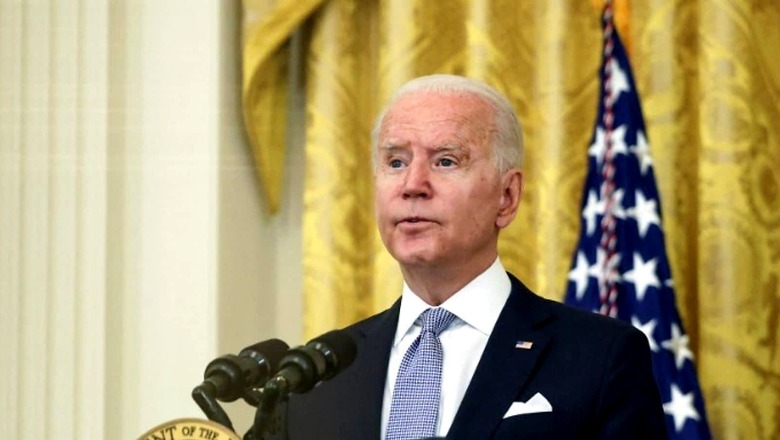
views
The irony of the August 31 deadline for completing the withdrawal of foreign troops from Afghanistan is that it was set not by the Taliban but by the US President Joe Biden. Of course, when he set the deadline he had no idea of how soon the roof would collapse over the ancient regime in Kabul. After the Taliban captured Kabul, the US and its allies had to scramble to evacuate tens of thousands of their own citizens and Afghans who were likely to be murdered by the Taliban for their association with the Western countries.
The sheer scale of the task of evacuating the multitudes desperate to escape death under the Taliban is so huge that it seems almost impossible that it will be completed by the deadline set by Biden. Last-ditch attempts, including the secret meeting of the CIA chief with Taliban leader Mullah Baradar to seek an extension in the deadline, have come a cropper. The Taliban are sticking to the deadline and have warned of serious consequences if foreign troops remain in Afghanistan after August 31. True to form, instead of insisting on an extension, the US President has stuck to the Taliban’s red-line. If that leaves thousands of Afghans in the lurch, just too bad.
A Badly Damaged Presidency
One way of looking at Biden’s decision to not press the issue is that he just wants to be out of Afghanistan. It is almost as if he can’t wait to wash his hands off the entire Afghan affair. He has taken and will continue to take flak for the botched withdrawal. His presidency is badly damaged. Already, there are voices in the US questioning his ability to lead the nation, and worse, his fitness for the office of President. The last thing he needs at this stage is all hell breaking loose in Kabul because the foreign forces do not vacate in time. Under no circumstance can he take the risk of a redux of the 1842 disaster when the British withdrew from Afghanistan. Such an event will suck the US right back into the Afghan vortex. Therefore, as long as Biden can manage to get all Americans out, he couldn’t care less about what happens to the Afghans left behind.
But there is another way to look at Biden’s impatience to exit Afghanistan. Till the time the evacuation doesn’t end, the US options will remain extremely limited. Simply put, the Americans will remain hostage to the Taliban and their backers while the evacuation continues. The most the Americans can do for now is dangle the carrot of aid, engagement and perhaps some international legitimacy and recognition before the Taliban, and string them along till they get all their people out. To expect the US to flex its military or economic and financial muscle when it is in fact extremely vulnerable is quite unrealistic.
ALSO READ | Can’t Blame Biden for Afghanistan Debacle; Time for US to Restore its International Credibility
But once the US is out of Afghanistan, many options will open up on how to handle the threats that could emanate from the region, how to ensure that Afghanistan doesn’t become a breeding ground for international and regional Jihadist terrorists, whether or not to back any resistance against the Taliban, how to apply diplomatic and economic pressure on the Taliban and its backers across the Durand Line to make them behave in a decent and civilised manner with their citizens and neighbours.
Three Options for Biden
Broadly, there will be three possible policy frameworks available to the Biden administration to choose from.
The first is to simply turn its back on Afghanistan and ignore whatever horrors visit the people of that country. The focus will be primarily on the bigger strategic competition with countries like China and Russia. Afghanistan will be a sideshow at best, not something on which the Americans will want to waste their time, energy and resources. In fact, it might be a better idea to let the countries of the region (which includes its strategic competitors) to get enmeshed in the Afghan quagmire, perhaps even provoke them into it. At the very minimum, these countries can foot the bill and pay the price for propping up the abominable Emirate of the Taliban.
Occasionally, the US and its Western allies will pontificate on the state of human rights, women and minority rights etc. But that’s about it. Meanwhile, they will develop some capabilities—the much talked about ‘over-the-horizon’ operations—to pre-empt any terror threat or retaliate against any attack. For the rest, they will leave it to the PRICs—Pakistan, Russia, Iran and China—to deal with whatever comes out of Afghanistan. Of course, such an approach will have its own consequences on not just American power projection but also its ability and credibility in confronting the expanding Chinese footprint.
The second framework could be one of engagement, even if limited. The Western countries will seek to exercise influence by giving humanitarian assistance and get a toe-hold in Afghanistan. The chequebook diplomacy will be the name of the game, and will be seen as a way to incentivise good behaviour by the Taliban, and perhaps their main backers, Pakistan. Many Western scholars and some former officials are already advocating this policy framework. Some are even speaking of possible cooperation on terrorism issues!
That this policy of throwing money at the problem in the hope that the Taliban and Pakistanis will deliver on curbing terrorist groups has failed miserably is conveniently being brushed under the carpet. What will also be ignored is the fact that while the West will try to buy influence by spending money on budgetary support, humanitarian aid, development programmes, the Chinese and Pakistanis will free-ride and grab whatever lucrative contracts might be on offer. The bottom line is that while the West will spend the money, its strategic adversaries like China, Russia and Pakistan will reap the benefits, and that too on the cheap. Worse, these countries will still continue to exercise far more influence inside Afghanistan than the West. In the end, it will be money down the tube. But somehow many Western countries still believe that this is the best way forward and no one should be surprised if they repeat the mistakes of the past.
The third possible framework is that the US and its allies will use their enormous financial and economic clout, and their political and diplomatic influence to inflict unbearable pain on the Taliban regime and its main backers like Pakistan. The financial and economic sanctions imposed on Afghanistan and Pakistan cannot be countered by countries like China or Russia.
EXCLUSIVE | Taliban Seek Foreign Aid to ‘Rebuild Nation’ After 20 Years of War, Have Special Message for India
Alternatively, the West could use international institutions like FATF (Financial Action Task Force) to ‘blacklist’ the Taliban’s Emirate. Indirectly, such a move will also put Pakistan in a bind—if it falls foul of the sanctions, there will be repercussions from the West; if it falls in line, there will be repercussions from the Taliban side. The West can also ensure that UN sanctions regime on Taliban and its Al Qaeda friends are not lifted. The crippling economic crunch will fuel resentment and perhaps even resistance and rebellion against the Taliban. The US and its allies could also fund and provision anti-Taliban forces. Of course, the bleeding hearts in the West could try to water down this hardline approach by advocating targeted sanctions so that the Afghan people are spared the hardships. But that would once again be a sub-optimal approach which won’t really affect or influence Taliban behaviour or strength. In other words, targeted sanctions won’t have any impact on the Taliban or its backers and controllers, and won’t give any real relief to the Afghan people.
What Biden does after August 31 will decide how seriously the rest of the world, and indeed America’s allies and partners, take the US going forward. While many countries will understand, even rationalise, his compulsions to quit Afghanistan in such haste, not many will understand a pusillanimous approach towards Afghanistan and Pakistan after the withdrawal is complete. The US is already looking weak and vacillating. If Biden can’t fix this huge image problem and crisis of credibility and reliability that the US now suffers, his legacy will be that of being the President who presided over the end of American power.
The author is Senior Fellow, Observer Research Foundation. The views expressed in this article are those of the author and do not represent the stand of this publication.
Read all the Latest News, Breaking News and Assembly Elections Live Updates here.




















Comments
0 comment